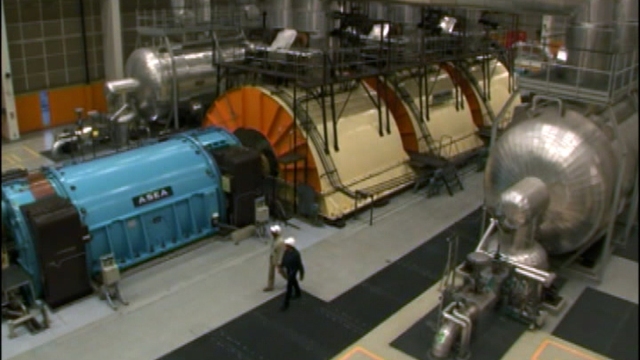Who's Afraid of Nuclear Power?
Is nuclear power the future of green energy or a worldwide disaster waiting to happen?
 Almost every day seems to bring more horror stories on fossil fuels. We're bombarded with reports about global warming. The price of oil keeps increasing. But with each gloomy media prediction, the nuclear industry can boast: we've got the clean answer. This documentary looks at different approaches to nuclear power. It focuses on Australia and Scandinavia - where attitudes couldn't be more different. While Australia derives 80% of its energy from coal, half of Sweden's power is nuclear. This doc holds the answers to why we persist with nuclear power.
Almost every day seems to bring more horror stories on fossil fuels. We're bombarded with reports about global warming. The price of oil keeps increasing. But with each gloomy media prediction, the nuclear industry can boast: we've got the clean answer. This documentary looks at different approaches to nuclear power. It focuses on Australia and Scandinavia - where attitudes couldn't be more different. While Australia derives 80% of its energy from coal, half of Sweden's power is nuclear. This doc holds the answers to why we persist with nuclear power.
In the conservation movement - once monolithic in its opposition to anything nuclear - fissures are appearing. "As a person who thinks climate change is the most important issue we face, I say thank you to the nuclear industry", raves Paul Gilding, former Head of International Greenpeace. Other environmentalists argue going nuclear is a neat but dangerous excuse for ignoring renewable energies like solar and wind.
But there's no dodging the issue any more. As global warming becomes undeniable, nuclear power is once again dominating the Green debate. "There is only one answer and that is to leave the carbon economy behind", proclaims New South Wales Premier Bob Carr. His country has the second highest per capita output of greenhouse gases in the developed world. But despite this, most Australians remain deeply sceptical to the idea of nuclear power.
Is Australia's aversion to nuclear power soundly based? Or are there lessons to be learned from other countries' experience? With hydro and nuclear power providing 90% of its energy, Sweden has one of the lowest comparable rates of greenhouse gas emissions. Despite vivid memories of Chernobyl, about 80% of Swedes back nuclear power - in fact they show more enthusiasm for it than their own government. "I don't see the reactors as dangerous or as a threat... I think it's clean and safe for the children", assures one local.
An impressive safety record and ambitious plans to safely dispose of nuclear waste has convinced most Scandinavians that nuclear is the way forward. In Finland, which suffered an even greater environmental impact from Chernobyl, authorities have commissioned the first new nuclear reactor in the western world since the 1986 disaster. "When it comes to Chernobyl, that was a reactor type that would never be approved in the West", explains Agneta Risiing, Vattenfall's Vice-President for the Environment. "Technology since those reactors has moved on a long way."
Both the Finns and their French and German suppliers claim that the new European pressurised water reactor will produce electricity safely and at a competitive price. But critics of nuclear power are sceptical. "It's really hard to get data on what's going on there. Is it really a free market? I would question that", states energy expert Mark Diesendorf.
Diesendorf argues that instead, we should be concentrating on cutting our profligate use of power and investing heavily in renewable technology. "They are certainly doing it in Denmark, the wind power capital of the world. This tiny, comparatively crowded country gets an astonishing 20 per cent of its electricity from wind power."
Whatever the answer, it's clear that fossil fuels can no longer address our energy needs. This report provokes and challenges the new debate.
FULL SYNOPSIS
